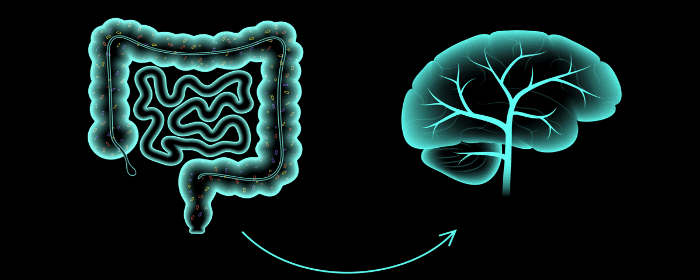
by admin | Mar 30, 2022 | Health Awareness
Scientists researching the human gastrointestinal tract’s microorganisms continue to find significant connections between the gut and patients’ overall health.
The gut microbiome, which is the name for these microorganisms, has inspired many studies as researchers continue to understand their impact on everything from brain disorders to joint pain.
While initial studies linking the gut microbiome to cognitive function showed connections, those studies used animal experiments and small clinical studies. On a larger scale, scientists examining the gut microbiome’s relationship to cognitive function recruited middle-aged participants from another study in four U.S. metropolitan areas.
Previous Studies
Previous studies looking at connections between the gut microbiome and cognitive function found links for short-chain fatty acids produced in the microbiota to influence cognitive health.
In animal experiments, rodents with reduced diversity in their gut microbiome showed cognitive defects, including reduced memory, impaired working memory, and changes in their brain.
Small-scale human studies also showed associations between the gut microbiome and cognition, including improvements when comparing controls to people treated with probiotics to increase their gut microbiome.
The Newest Results
In scientists’ newest study, they analyzed the cognitive function and microbiomes of 597 participants between 48 and 60 years old, with a mean age of 55. The study focused on participants’ gut microbiome diversity in connection with six cognitive tests.
The studies concluded a significant association between participants’ microbial composition and cognitive function. All of the conclusions drawn were in line with the previous small-scale human studies and animal studies.
Conclusions
While researchers carefully note that this study needs replication in larger human samples, some of the initial findings support short-chain fatty acids playing an instrumental role in regulating the interaction between the gut and the brain, known as the gut-brain axis.
Short-chain fatty acids are one of the main byproducts of the microbiome and may have neuroactive properties.
Animal studies found short-chain fatty acids protecting the brain against vascular dementia and cognitive impairment. Recent results support a strong connection between nutrition, microbiome composition, and cognitive function.

by admin | Mar 23, 2022 | Health Awareness, Multiple Sclerosis
The neurodegenerative condition known as multiple sclerosis (MS) causes chronic inflammation within the central nervous system. For decades, clinicians and researchers have tirelessly studied MS to understand the condition better and develop more effective treatments.
Recently, researchers from the Harvard T.H. Chan School of Public Health concluded a study that examined the link between the Epstein-Barr virus (EBV) and multiple sclerosis. They found “compelling evidence of causality” between EBV and MS.
Researchers analyzed data from over 10 million active-duty U.S. military personnel during the study. Of these participants, 955 received an MS diagnosis while serving.
Researchers reviewed serum samples that were collected biennially in order to check for the presence of EBV. As a result of the study, researchers discovered that soldiers were 32 times more likely to develop MS after experiencing an EBV infection.
However, it is essential to note that MS symptoms typically do not manifest until approximately ten years after patients acquire an EBV infection. Researchers theorized that this delayed onset might be partially attributed to ineffective MS diagnosis protocols, as early symptoms are difficult to detect.
What This Means for MS Patients
Currently, no effective EBV infection treatments or preventatives exist. However, researchers are optimistic that the development of an EBV vaccine or antivirals could pave the way for a multiple sclerosis cure.
In the meantime, patients suffering from MS should continue to work with their primary care providers to mitigate the impact of symptoms and slow the progression of the condition.
For those seeking an alternative treatment option, stem cell therapy has shown some promise for treating neurodegenerative conditions like MS. Stem cell therapy may yield several positive benefits such as a reduction in muscle spasticity, improved balance, increased energy, and reduced muscle pain.

by admin | Mar 16, 2022 | Health Awareness, Multiple Sclerosis
What if there was one simple thing Multiple Sclerosis (MS) patients could do every day to increase energy levels, reduce fatigue, and help prevent the chance of injury from falls?
Great news—there are simple exercises you can do at home without expensive gym memberships or special equipment. Try these stretching, strengthening, and balance moves to help improve your overall wellness.
Marching in Place for Balance
Stand with your feet about hip-width apart. Contract your abdominal muscles, and slowly bring one knee off the floor in a marching position. Lift the thigh parallel to the floor if you can.
Pause for a count of three, and slowly lower the leg. Repeat on the other side. Continue for five repetitions, working your way up to 10–15 repetitions.
Wall Push-Ups for Stretching and Upper-Body Strength
Stand or sit facing a wall, approximately two feet away, with your feet together. Place both palms flat on the wall with arms straight at shoulder height, slightly wider than shoulder-width apart.
Lean in, keeping elbows tucked to your sides. Bring your nose close to the wall, and feel the gentle stretching in your calves and chest. Hold for one breath, checking to make sure your back is straight.
Slowly return to the starting position. Repeat three times, building to as many repetitions as you can.
Single-Leg Pose for Balance
Do this exercise while holding onto a chair or table for stability, especially if you have problems with balance or are receiving treatment for a neurodegenerative condition.
Stand with your feet shoulder-width apart. Lift your arms parallel to the floor, keeping one hand on a stable surface. Straighten one leg in front of you with your heel a few inches off the floor.
Hold and balance for up to 30 seconds. Lower your foot back to the ground. Repeat on both legs for three repetitions.
Over Head Press for Upper-Body Strength
Use lightweight dumbbells for this exercise. If you don’t have weights, try using soup cans or full water bottles.
Holding your weights, stand (or sit) with a straight posture, arms out to your sides, and bent upward with your hands at ear height. Stretch your arms up, keeping your back straight and lifting the dumbbells over your head. Your biceps should be close to your ears. Return to the starting position. Repeat ten times.
For more health awareness blogs, please visit www.stemedix.com/blog.

by admin | Mar 9, 2022 | Health Awareness, Chelation Therapy
Chelation therapy is an effective treatment for heavy metal poisoning. First used in the 1950s to treat lead poisoning, healthcare providers now use chelation therapy regularly to remove several heavy metals from the body, including lead, mercury, iron, copper, arsenic, aluminum, and calcium.
How Does Chelation Therapy Work?
Chelation therapy removes metals from the bloodstream using ethylenediaminetetraacetic acid (EDTA). A healthcare provider injects EDTA into the bloodstream. ETDA travels throughout the body, collecting metals and forming a compound. The kidneys eliminate the compound through urination.
What Are the Symptoms of Heavy Metal Toxicity?
Environmental metals in the body can cause short and long-term health consequences. Metal toxicity affects the central nervous system, the skeletal and muscular systems, and the immune system. Symptoms of heavy metal toxicity include:
- Forgetfulness
- Chronic fatigue
- Joint or muscle pain
- Autoimmune disease
- Mood changes
Heavy metal toxicity can also cause long-term damage to vital organs if left untreated.
What Are Potential Benefits of Chelation Therapy?
While research into the benefits of chelation therapy is still ongoing, promising studies show that the treatment can potentially reduce inflammation, improve heart health, and reduce infections.
Heart Health
Atherosclerosis, also referred to as the hardening of the arteries results from the buildup of cholesterol and calcium deposits. Injecting EDTA into the bloodstream may collect and remove the calcium in the arteries, loosening blockages and aiding in blood flow.
Antioxidants
Chelation agents, like EDTA, may work similarly to antioxidants in the body, reducing inflammation and removing metals that serve as the foundation of disease development.
Cognitive Health
Research shows that increased copper, iron, and zinc may be associated with various neurodegenerative diseases, including Parkinson’s disease and dementia. Using chelation therapy to remove metals throughout the body can potentially relieve these cognitive disorders.
The potential of chelation therapy for treating various conditions continues to emerge. New studies and research suggest that this alternative treatment may soon become more mainstream.

by admin | Mar 2, 2022 | Health Awareness, Pain Management, Rheumatoid Arthritis
Do you suffer from aches and pains due to rheumatoid arthritis (RA)? The stiffness caused by RA is a nuisance for many patients and it is especially prevalent in the morning. When you awake from even the most comfortable of sleep, your joints may feel painful and stiff for several hours. How can this be avoided?
4 Ways to Reduce Morning Stiffness for RA Patients
Most patients turn to over-the-counter pain medications to ease their RA morning stiffness, but there may be some other alternatives. The following are four ways to reduce rheumatoid arthritis stiffness and start your day off right.
1. Turn Up the Heat
Experts suggest turning your heat up about 30 minutes before you plan to start your day. This will allow time for your joints to warm up and feel less stiff while you take it easy and relax in bed or have your morning coffee. By the time you need to get ready and head out the door, your body will feel more relaxed, and stiffness may be decreased.
2. Take Medication as Soon as You Wake Up
While you’re turning up the heat, go ahead and take any of your rheumatoid arthritis medications. You want to give your medication time to kick in and take effect before you begin your morning routine. This will help ease most of the aches and pains that you may feel in your joints during morning activities.
3. Practice Gentle Movements
Once you are ready to get out of bed, practice gentle movements rather than jumping to your feet and rushing around the house. Simple range-of-motion exercises can help stretch your muscles and loosen joints in the hands, wrists, and feet.
4. Take A Hot Shower
While many people opt for nighttime showers, RA patients may benefit from taking a hot morning shower. Taking a warm shower upon waking in the morning will help loosen and relax the joints, decreasing any stiffness or aching.
If you suffer from chronic pain from your rheumatoid arthritis, you may want to explore how regenerative medicine, also known as stem cell therapy, may help manage symptoms. In addition, some patients are discovering help from peptides. These are chains of amino acids, and some may have the potential for those with chronic pain. Alternative medicine does not offer a cure, but for some, it may help improve quality of life.

by admin | Feb 23, 2022 | Health Awareness
Glutathione is a powerful antioxidant that is composed of three amino acids: glutamine, glycine, and cysteine. Every cell of the body contains glutathione, and by researching the effects that glutathione levels have on a variety of diseases, scientists continue to discover its benefits.
Functions of Glutathione
Like all antioxidants, glutathione serves many essential functions for the body. These include:
- Making DNA
- Forming sperm cells
- Breaking down some free radicals
- Supporting immunity
- Helping the liver and gallbladder process fats
- Regenerating vitamins C and E
- Transporting mercury out of the brain
Despite the body’s ability to make glutathione, levels tend to decrease as you get older. Poor nutrition, stress, and environmental toxins can also lower glutathione levels.
Benefits of Glutathione
Benefits of maintaining your glutathione levels, either through a healthy diet and exercise or through topical, oral, or intravenous supplementation include:
Antioxidant Activity
Antioxidants help counteract free radicals, which contribute to aging and some diseases. Therefore, powerful antioxidants like glutathione can protect the body from the damaging effects of free radicals.
Reducing Cell Damage from Liver Disease
Antioxidant deficiencies can worsen the fatty liver disease, contributing to further cell death. Conversely, glutathione may improve the protein, enzyme, and bilirubin levels of patients with chronic fatty liver disease.
Reduced Insulin Resistance in Older Patients
A study examining the role that glutathione plays in weight management and insulin resistance connected low glutathione levels to less fat burning and higher rates of fat storage. Increasing glutathione levels may help older patients manage symptoms of insulin resistance.
Reduced Symptoms of Parkinson’s Disease
While further research is still needed, a study connecting the effects of intravenous glutathione treatments on Parkinson’s disease symptoms, including tremors and rigidity, reported improvement for patients.
Assistance in Fighting Autoimmune Diseases
Autoimmune diseases can cause chronic inflammation and increase oxidative stress. Glutathione may help in reducing oxidative stress by eliminating free radicals and protecting cell mitochondria. Scientists are still uncovering the ways that glutathione can benefit our overall health. Meanwhile, you can work to maintain your natural glutathione levels through a healthy diet, getting enough rest, and avoiding environmental toxins.







 St. Petersburg, Florida
St. Petersburg, Florida
